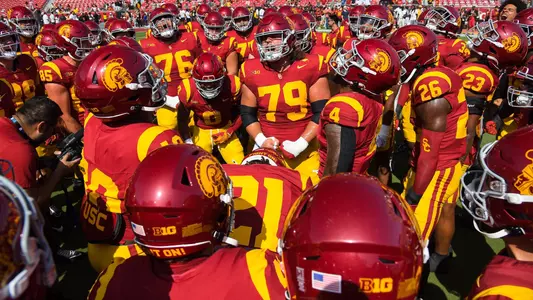
In a bold and unprecedented move, the USC Trojans football team announced that they would transition to online classes during games in an effort to attract more transfer quarterbacks. This strategic shift, which has caught the attention of both the college football world and the academic community, is a part of USC’s ongoing effort to adapt to the rapidly changing landscape of college athletics and the ever-growing influence of the transfer portal.
The decision comes on the heels of USC’s struggles in recruiting and developing quarterbacks over the past several seasons. Despite having a rich history of producing top-tier quarterbacks—most notably Heisman Trophy winners like Carson Palmer and Matt Leinart—the Trojans have found themselves in a quarterback quandary in recent years. With uncertainty at the position, the team’s leadership has taken an unconventional approach to build depth at the most crucial position on the field.
“Look, if we can’t recruit them with just our football program, we’ll make sure we have something else to offer,” said USC athletic director Mike Bohn. “We realized that the traditional methods of recruiting weren’t resonating with the modern college athlete. Everyone’s talking about NIL deals and playing time, but we wanted to offer something unique—flexibility. What’s more flexible than online classes? It’s a win-win.”
USC’s new online class initiative allows incoming quarterbacks to take their coursework remotely while still participating in practices, meetings, and games. By switching to an entirely virtual format, the Trojans aim to provide a more appealing environment for transfer quarterbacks who may want the flexibility to focus on football while still maintaining their academic eligibility. The move has already sparked intense debates in the world of college athletics, with some praising USC’s forward-thinking approach and others raising concerns about its long-term viability.
The Trojans’ new system works by giving players the option to attend classes in person at USC’s campus or log in from anywhere they choose. The online platform is designed to be fully interactive, with live lectures, virtual office hours, and extensive online study materials. With this model, players can be on the road for games or practicing at the team’s training facility while staying on top of their academic responsibilities.
USC has already begun to see interest from transfer quarterbacks who were previously hesitant about committing to the school due to the traditional demands of college athletics. One such player, former Oklahoma State quarterback Spencer Sanders, was reportedly drawn to the program’s flexibility after having trouble balancing his academic workload with the intense demands of football.
“Football has always been my priority, but I still want to get a degree, and the online classes really take the pressure off,” Sanders said in an exclusive interview. “I’ve been to other schools where the schedule was a grind, and it felt like there was no time for anything else. USC really gets it—they understand the importance of balancing football with academics. I’m excited about the opportunity here.”
The online class strategy has already been tested during USC’s spring practices, where coaches reported positive results. Players seemed more relaxed and focused, with many noting that they appreciated the ability to complete assignments and attend lectures from the comfort of their own homes. It’s a system that has allowed players to manage their time more effectively, ensuring they can dedicate ample attention to their craft on the field without sacrificing academic performance.
Critics, however, argue that the move could undermine the integrity of the student-athlete model, which has long been a cornerstone of college athletics. Some college football experts worry that reducing the in-person classroom experience could further erode the concept of student-athletes as true scholars. These critics claim that players might treat their education as secondary to their football careers, potentially leading to lower academic standards for athletes.
“I think it’s a slippery slope,” said NCAA critic and former college coach, Jerry Wylie. “There’s a risk that this will become a trend where schools cater to athletes at the expense of academics. The point of college football is to educate these young men while they play the game, not to just make it easier for them to avoid the classroom.”
However, USC has dismissed such criticisms, pointing to the success of other virtual learning initiatives across the country and the growing demand for flexibility in today’s academic environment. The school’s administration argues that this is not a move to “dumb down” academics but rather to provide student-athletes with the tools they need to succeed both on the field and in the classroom.
“The reality is that the traditional college experience is not for everyone, especially when you’re dealing with athletes who have unique schedules,” said Dr. Carol Folt, President of USC. “We are embracing a model that gives these young men more control over their academic lives while ensuring they are still getting a high-quality education.”
In the long term, USC’s gamble may pay off. The Trojans could emerge as a powerhouse in quarterback recruiting, attracting top-tier talent who value the opportunity to excel in both athletics and academics without having to sacrifice one for the other. If successful, other programs may follow suit, adapting their academic structures to cater to the evolving needs of the modern student-athlete.
For now, the Trojans’ decision to switch to online classes mid-game is both a bold experiment and a symbol of the changing nature of college football. As the sport continues to evolve, USC seems determined to stay ahead of the curve, offering a unique model that may soon become the norm for top-tier programs around the country. Whether or not this strategy will lead to a national championship remains to be seen, but one thing is clear: the Trojans are embracing change with a willingness to innovate.






